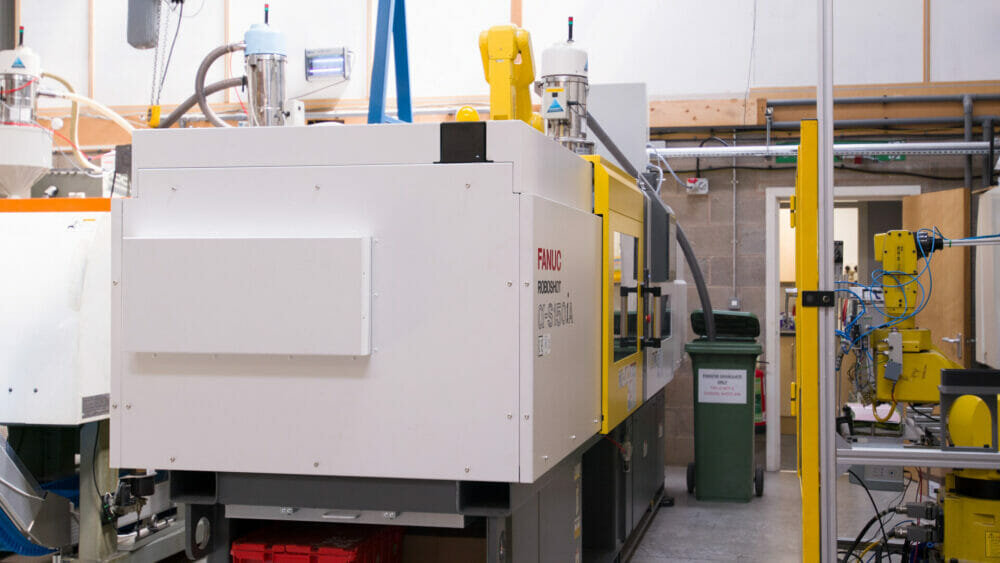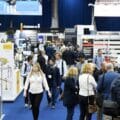Following its investment in an energy-saving FANUC ROBOSHOT injection moulding machine, eco-conscious plastic products manufacturer Bloom-in-Box is well on the way to becoming carbon neutral. Thanks to superior servo technology and intelligent power regeneration capabilities, the energy-efficient ROBOSHOT S150iA installed at Bloom-in-Box’s Burscough facility uses just 3kW per hour, permitting it to be powered exclusively by renewable solar energy.

“Our goal at Bloom-in-Box is to become carbon neutral over the next 12-18 months. We have been working with all-electric machines for the last 20 years to reduce power consumption and emissions. Solar installations and our new FANUC ROBOSHOT were the next steps to achieving this. Thanks to these latest investments, our current carbon emissions as a business are estimated to be less than 10 tonnes of CO2 per year, with our ultimate goal to achieve net zero,” says Tom Reardon, production coordinator and robotics engineer at Bloom-in-Box.
Born again plastics
Bloom-in-Box is a third-generation, family-run plastic injection moulding business grounded in an ethos of responsible consumption and production. A commitment to creating products with more than one life drives the company’s design and manufacturing activities and in 2018 earned Bloom-in-Box a place in the final of Best Recycled Plastic Product of the Year for its Bloomie floristry box. The Bloomie is made from 99% recycled material and is 100% recyclable. Any boxes that mould incorrectly are chopped up, passed through a grinder and made into security spikes. Other products made by the business include laundry pegs, scoops and measures.

Bloom-in-Box has been involved in injection moulding for more than 20 years and has always been an advocate of electric moulding machines on the basis that they use up to 80% less energy than their hydraulic counterparts. When significant growth meant the company had reached maximum production capacity last year, it took the decision to invest in a new electric machine that would enable it to increase capacity by 25-40%.
“We had reached a plateau. Our older machines were slower, causing production bottlenecks, and lacked the precise temperature control needed for working with biodegradable plastics,” recalls David Reardon, director of Bloom-in-Box.
Carbon neutral ambitions
At the same time, the company had embarked on a roadmap to become carbon neutral, starting with an assessment of its carbon footprint. This revealed that electricity was its biggest source of carbon emissions, accounting for 95% of its total emissions. To address this situation, in November 2021, Bloom-in-Box installed a 40kWp solar system that feeds directly into the factory. During daylight hours this generates on average 10kW per hour, with the potential to produce even more electrical energy during the summer months.
Therefore, when it came to deciding which injection moulding machine to invest in, energy efficiency was a top consideration, alongside production speed, quality, CNC reliability and repeatability. Bloom-in-Box wanted this machine purchase to support its carbon emission reduction ambitions and to be powered exclusively by the new solar panels.
This search led Bloom-in-Box to FANUC’s ROBOSHOT range, which the company claims are the most energy-efficient injection moulding machines available today.

“In our opinion, FANUC machines are at the top of the league table for energy efficiency in injection moulding,” says Tom Reardon.
It is well known that all-electric injection moulding machines use up to 80% less electricity than a hydraulic machine of a comparable size. FANUC’s ROBOSHOT goes even further than this; the company claims it consumes 10-15% less energy than the average all-electric machine.
Energy efficient design
The ROBOSHOT’s best-in-category energy efficiency can largely be attributed to a combination of FANUC’s proprietary servo technology and smart energy recovery.
“Rather than buying them in from a third-party manufacturer, we build our own servo drives, meaning they are as energy efficient as is physically possible. This also enables us to specify servo drives that are the perfect match for each machine’s target performance, ensuring they deliver exactly the amount of power to the motor that it needs,” explains David Raine, ROBOSHOT sales manager UK and Ireland.

In addition, the ROBOSHOT’s advanced power regeneration feature enables intelligent energy recovery: when an axis decelerates, energy returns to the power source, adding to the overall savings.
“When the equipment starts to decelerate and the motor is no longer required to drive a process, it automatically switches to being a generator, feeding the electricity that is generated back through the system to another location on the machine where it is needed,” says Raine.
The 150T clamp force ROBOSHOT S150iA in operation at Bloom-in-Box runs at 2.9-3kW per hour for a six-second cycle (the longer the cycle the less energy consumed), reducing energy consumption by 20% versus previous generation electric machines in the plastic processor’s fleet.
“This represents a huge saving both in terms of CO2 emissions and energy bills,” says David Reardon.
As well as being well on track to becoming carbon neutral, Bloom-in-Box is well-placed to expand its garden, scoops and measures ranges and to develop new medical and PPE products.








